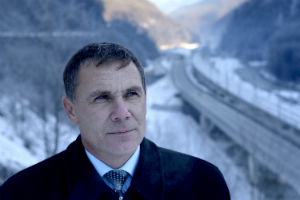By Conor Fortune, News Writer, and Friederike Behr, Researcher on Russia at Amnesty International

There’s plenty wrong with the environment in Russia today, though the authorities might have you believe otherwise.
It’s true that the country boasts an expansive network of protected areas. And President Vladimir Putin appears to relish media coverage of his bare-chested escapades fishing and riding on horseback through the seemingly pristine Russian countryside.
But scratch beneath this healthy veneer and the reality is not so clean and green. The aftermath of decades of poor policy and corruption dating back to Soviet times continues to result in problems ranging from deforestation and air pollution to chemical contamination of ground water.
And new threats loom on the horizon. A joint Russian-US enterprise to drill in the Arctic Ocean bed has reportedly just struck oil. The project sparked heavy outcry from environmentalists in Russia and abroad for its potentially devastating impact on a previously untouched habitat.
But don’t expect the Kremlin to announce an about-turn to tackle these issues anytime soon. Raising environmental awareness is deeply unpopular, and Russian authorities at all levels are quick to stamp out any suggestion that the country’s laissez-faire attitude to environmental protection could be problematic.
A group of 30 international and Russian activists learnt this the hard way in September 2013 when they navigated the Greenpeace vessel Arctic Sunrise into the Pechora Sea, off Russia’s northern coast, in a protest against deep-sea drilling. After the activists affixed a protest banner to the drilling platform, Russian security forces armed with guns and knives boarded their ship, and rounded up the crew while destroying radio equipment and other items on board.
It was not the marauding, knife-slashing raiders who were brought to trial, but the peaceful activists, who were initially branded as “pirates” before being prosecuted on a lesser charge of “hooliganism”. Amnesty International campaigned against the charges as “patently absurd” and highly inappropriate for people engaged in peaceful protest.
Then there was the case of Evgeniy Vitishko. Last February, while the world’s eyes were trained on the Sochi Winter Olympic Games in his home Krasnodar Region, the activist from the NGO Environmental Watch for North Caucasus was thrown behind bars, on “hooliganism” charges for protesting against the environmental impact of the rampant development around the Games.
If harassment was an Olympic event, the Russian authorities were vying for the gold medal. In the run-up to and during the Games, Evgeniy and other members of his organization were subjected to repeated arrests, brief detentions, personal searches, questioning by police, and unofficial warnings to abstain from protesting.
A string of trumped-up petty charges were used to vilify him: from swearing at a bus stop to breaking an unlawfully erected fence. After losing an appeal in February, he is now in a penal colony, serving out a three-year sentence. In August he staged a brief hunger strike and it is not known what his current state of health is, but he is reportedly facing a transfer to another penal colony with harsher conditions. Amnesty International continues to consider him a prisoner of conscience and call for his immediate and unconditional release.
Another who paid the price for speaking out on environmental issues was journalist Mikhail Beketov – one of the earliest critics of the authorities’ decision to build a motorway between Moscow and Sheremetyevo airport through the once-beautiful Khimki forest. He was attacked and seriously injured in 2008 and never properly recovered. He died in 2013. The perpetrators of the attack have not been found.
The Khoper river nature reserve in central Russia has been another flashpoint since plans were announced for copper and nickel mining in the area. Eco-activists have repeatedly been targeted by the authorities, with several having their homes raided by anti-extremism officers in February 2013. Two of the anti-mining protesters have been detained since November 2013 charged with extortion. The investigators reportedly insisted in court that they should remain in custody while awaiting trial due to their status as “activists” who may try to influence others. The judge approved their remand.
The message sent by the authorities’ recent treatment of environmentalists has been loud and clear. Criminal prosecution of civil society activists has become their tool of choice to clamp down on critics.
Other NGOs working on environmental issues in Russia are wondering if they will be next.
“We’re waiting. The moment we step out of line and talk about a difficult point, they’ll be ready,” Alexander Nikitin of Environmental Rights Center Bellona recently told us at his office in St. Petersburg.
His fear is that the authorities will now step up their efforts, and use the controversial “foreign agents law” to intimidate and hamper the work of environmental NGOs they see as a thorn in their side.
“If there’s an official who doesn’t like the organization, they’ll find a reason to close it. If they want to stop us working, they’ll include us in the [‘foreign agents’] list,” he said.
This isn’t mere paranoia – in July the Russian Ministry of Justice named the NGO EcoDefense as a “foreign agent” involved in “political activities”. The group raises the spectre of the fallout from the 1986 Chernobyl nuclear disaster in its campaigns against new nuclear projects.
Amnesty International will continue to support the right of Bellona, Environmental Watch, EcoDefense and others to speak out and work to ensure that future generations can enjoy a healthy, cleaner environment in Russia.
Despite the rapidly shrinking space for freedom of expression, many people in Russia are speaking out. Between 6 and 12 October Amnesty International activists stand with them in solidarity during a week of action to make sure Russia’s leaders know that the rest of the world will not be silent. Take action and find out more on www.amnesty.org/Speak-Out-Russia.

